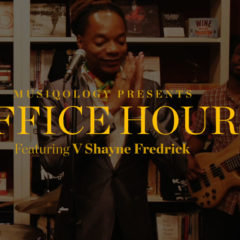This is the second track of the first edition of the Extended Play series, a new MusiQology miniseries on a theme or concept that deserves more than a single-article treatment. Giving our contributors the space to explore and develop this type of work is important because the proliferation and justification of concepts is an important skill for academic writing. Like the EP for musicians, these give us, our writers, and our readers the chance to explore themes and concepts, testing them out before delivering the full album.
Over the next several weeks, MusiQology Managing Editor John Vilanova will be doing a deep hypothetical exploration of the 2018 GRAMMY Awards nominees for Album of the Year. Each article will ask the same question of a different artist: “What would a win by this artist mean?”
Looking back on our live tweeting of the 2017 GRAMMY Awards, it’s a stark reminder of what it felt like when Adele Atkins’s name was called to receive the golden gramophone for Album of the Year over Beyoncé Knowles. There was anger and betrayal, but also a certain kind of knowing resignation. Of course this was happening. A black woman hadn’t won Album of the Year in the entire 21st Century. That wasn’t how this worked.
What was frustrating, though, was the extent to which Beyoncé’s Lemonade felt like a new kind of media text. In addition to its multimedia components—while I’m sure someone has said “visual album” before, ask anyone on the street and the first one they’ll be able to name is this one—the album’s message was clear: Beyoncé was disappointed with her husband for his distance, infidelities, and dishonesty. Whispered in the album’s opening moments, “Where do you go when you go quiet?” felt like a question not typically asked of our men. “Are you cheating on me,” where we all knew who the you was, was both a universal and a specific.
Beyoncé and Jay Z’s almost-two-decades relationship has been dogged with accusations and rumblings of Hov’s infidelity since its early days. After their April 2008 marriage and the January 2012 birth of their daughter, Blue Ivy, the rumblings grew to a roar, culminating with leaked security footage showing Solange Knowles, Beyoncé’s sister, attacking Jay in an elevator, on May 12, 2014. That summer, as Knowles performed “Resentment,” she changed lyrics to more clearly reference her husband, but innuendo, blind items, and hearsay were all the public has to go on.
Until Lemonade.
From the opening intonation, Mrs. Carter reveals her family’s dark secrets, taking them from whispers to a car-window-smashing, glorious therapy session on her terms. But it’s more than the most public dirty laundry airing —it’s the recession of the tidewater line getting the stones into formation years before the tsunami of #MeToo and #TimesUp. It’s a generous act, to give voice to others through your own personal story, to provide sweet nourishment for women looking for a drop. When life hands you a cheating husband, make Lemonade.
But Lemonade isn’t up for the 2018 GRAMMY Award for Album of the Year. 4:44 is. And this article isn’t supposed to be talking about Lemonade and its importance. But it is.
Because we don’t get 4:44 without Lemonade. We don’t get a renewed commitment, a high-stakes message that Sean Carter feels a moral obligation to deliver publicly, pushing himself to explore contrition and public penitence. Has Jay Z ever sounded earnest before, like he does on the album’s title track? Has he ever sounded so mortal (in a good way) as he does on “Legacy?” Has he ever sonically prioritized something other than his own swag?
If 4:44 wins, is it an ounce of redemption for Lemonade? Is it the kind of wrong-headed wrongs-righting reparations make-up call we concluded DAMN would be?
If it is (and I think in the minds of voters it is), then that reveals the most meaningful conclusion we can draw from a 4:44 victory: To the GRAMMYs, men’s voices and stories are more important than women’s. A 4:44 win—while not in direct competition with Lemonade—suggests that the redemptive honesty of Jay Z’s admission deserves validation and a place in the history books, while his wife’s braver (in my opinion) castigation fell short. Voters are glad Beyoncé made Lemonade, but the truly exceptional act was to apologize. Maybe that’s true to some extent in a patriarchy, but that’s a cynical and dark precedent.
A Jay Z victory further sidelines the important work of Lemonade. He should be applauded for this art and the work he has done to admit his faults and failings as a husband, and that he too has set an example through this work. But a win—in a time when we’re still pruning the branches of the deeply rooted pa-tree-archy—means something very particular and insidious.
There are good moments on 4:44 to be sure. “The Story of O.J.” is a fascinating connection to the man on the public opinion trial of the century. The Clarke Sisters sample on “Family Feud” drills deeply into you and reverberates around your bones. Jay Z is confronting his mortality, his history, and his choices. That’s brave, even if to this writer it produces an insubstantial album. But a Jay Z win would be substance over style, and the true substance of his infidelity is not just his to mine. The true substance of 4:44 is connected to what came before.
Further, a 4:44 win would suggest that the Recording Academy and its voting body are even more at odds than anyone realizes. Remember, the GRAMMYs insist that they vote purely on objective criteria—the music itself is allegedly the only thing to consider. The most notable thing about Jay Z’s 4:44 is its accompanying story—the liner notes dispersed across the winds and whispers of our gossip, the digital bites and bits of the elevator’s security camera, and the broken shards of glass from the “Hold Up” video. This is an album that made it this far because of its social profile and its musicality, with the former, it seems, playing an outsized role.
So in the end and through no fault of his own, it’ll be hard to root for Jay Z. These albums are art—and it’s fine to judge them as such—but in this case, celebrating his work sends the wrong message about whose side of the story—or the family feud—matters.

 Share On Facebook
Share On Facebook Tweet It
Tweet It








